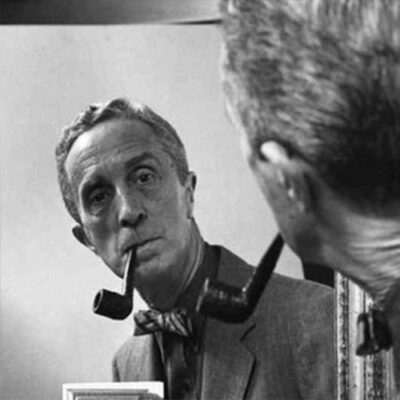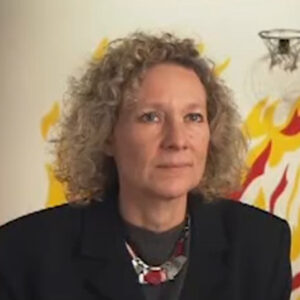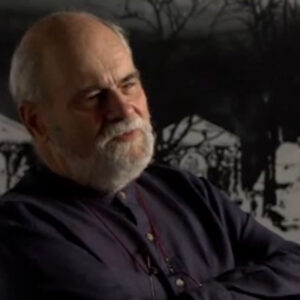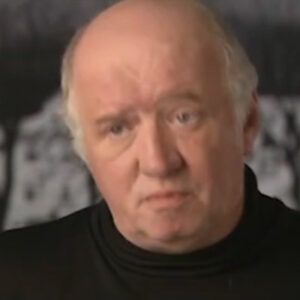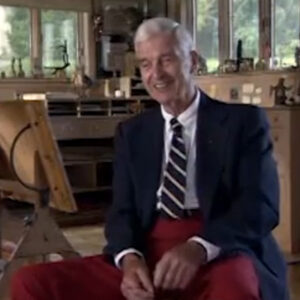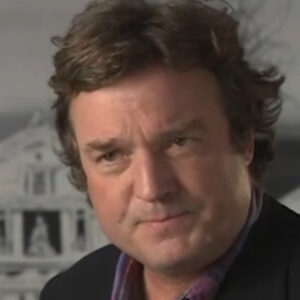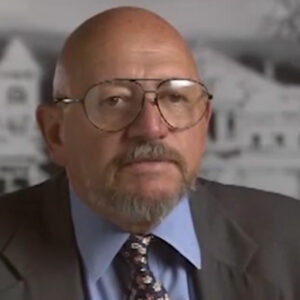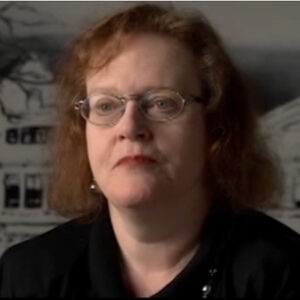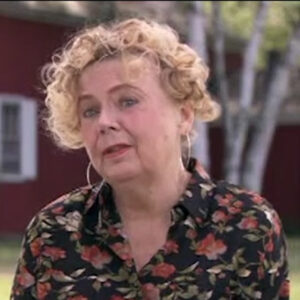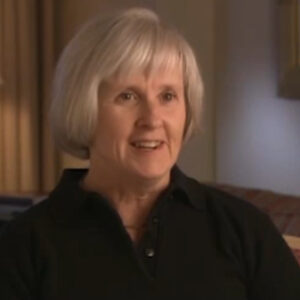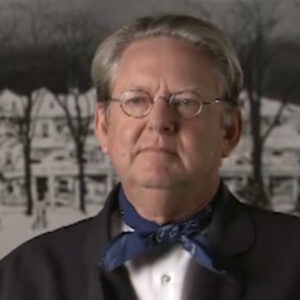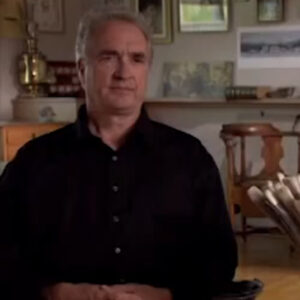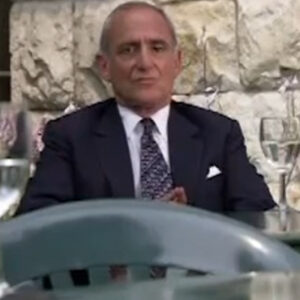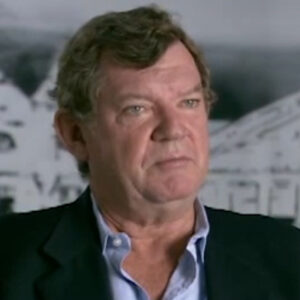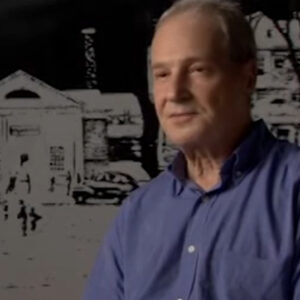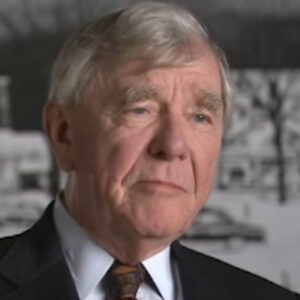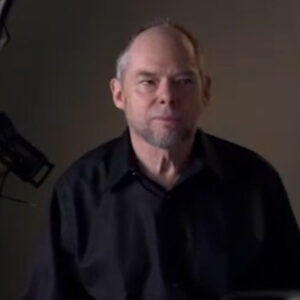Speaker Well, as bad accidents, because somebody else needed me to be there to give him moral support, so I just sat while he was photographing and then he decided he didn’t want to do it anymore.
Speaker So I pitched in.
Speaker Sorry, I.
Speaker This is my assistant here. Not now.
Speaker She’s in front of that wonderful squeaks. All right.
Speaker All right. Tell me again how you first met Rockwell and started to work with them.
Speaker I met rockfalls more or less by accident. You know, just living in town, of course, you know, beat everybody, see everybody. But I wasn’t a tremendous. Another photographer working for him asked me to pitch in to. He needed some moral support. For some reason. I didn’t know. He just wanted me to sit. Which I did. And then at some point, he decided he couldn’t photograph anymore. He asked me, could I take over for him? That’s how it started.
Speaker And was Rocco was happy with your work?
Speaker Yeah. I mean, it was no problem. Well, what year was that one?
Speaker One was that I would have to look, I have roughly four in the early 60s.
Speaker So he was using photography heavily. And can you tell me something about his work process, what it was like?
Speaker Yeah, it was fun for me. It was way simple work. He set up a scene in the studio. And when it seemed ready, I click clicked a few times and I left it until the film did. And then he would take I would go home and to the process and show him contact prints and you pick out something which I then drew up to eight by 10.
Speaker He really had to paint completely from reality, right?
Speaker I mean, yes, I was puzzled. I ask him at some point, how do you get the exact proportion from an eight to 10 photographs to a painting of two or three feet or whatever? So do you use a grid? He said, no. It’s very simple. Is it? How does it come to show you you open the door for this big document? And it was this big projector, one of these opaque projectors. I said, oh, yes. Is a projector right on the canvas? Yes. And then it gets to see a sharp Chanko pencil every every detail.
Speaker And I’m his wife. Sounds like kind of painting by numbers, like a coloring book. Were you surprised by that?
Speaker Yes. Somehow I thought he just used the photographs for a general reference. I didn’t realize he was the actual exact photograph, except not just in line.
Speaker Did it seem peculiar to you a painter would work in such a literal way?
Speaker Well, he never calls himself a painter. He said, I’m a commercial illustrator, which is a definite distinction, maybe not to the general public, but the commercial, as was a commercial artist. You do what the client expects you to do and you do as well as you can. And he was very good at doing it. But he didn’t have so much to do as his own views of things. You know, he executed things that people wanted.
Speaker So if it wasn’t really an imaginative artist. What you say?
Speaker Well, not in the sense of one thinks of most artists have a very vivid imagination that they have to express their own views of the world. That was not so much as. I guess intended. I don’t know where it started as liking for this very quaint country like cactus. I didn’t go up in the country, as he was known, a shell, which might have been almost the country at the time. But apparently his approach to the early points was popular. So he kept getting commissioned to do more and more. And it stuck with him his whole life. And he was not always happy, but he got sick of it at some point. And one, he said to me that, gee, if I could start all over again, I would paint like Picasso.
Speaker So we joked about it.
Speaker I mean, do you think he really was frustrated in some way by.
Speaker Well, sometimes, yes, sometimes.
Speaker Sometimes he asked why he was bored or frustrated when they slammed the door, which was unlike him. I said, what’s the matter?
Speaker 35 years of postcard counters. I’ve had it. So I said, why don’t you stop? I mean, you don’t need the money.
Speaker And he was a no, I can’t. You know, he was sort of into this so much he couldn’t stop. And he worked down night, day and night holidays. Some days he almost worked, would get called Sunday afternoons and to have a minute. Sure. And needed something to say. All right.
Speaker So why do you think he felt trapped by his.
Speaker Well, I don’t know if it was that severe, but it was definitely something he couldn’t do without. He hardly ever took a vacation. People had to pry him way. The only time I remember vacation was after his wife died, and he was pretty bad shape. He was, you know, didn’t look well. And he was supposed to visit his son in Rome. Friends kept urging and so finally said, all right, I’m going and have delivered something to him. I say, see you in a few weeks. In a couple of days later, he called, said, we are you said, can you come down and do some things that what do you. Are you in Rome? I said, no, I’m in my studio. So how come away with it?
Speaker Well, when I got to Gibraltar, I got a cold, so I took a plane home. So this was very sad for once that he was going to relax. He couldn’t make it.
Speaker He was back to work. And so much more complicated man, I guess, than one would think.
Speaker Yeah, no more complicated than the images that he created. A team of a simple and happy in a dream land of the good old days, which most people seem to would like to believe that once upon a time there was the good old days. Radio hit history books as necessarily wasn’t so, so good. In fact, when he grew up, I guess it was the Depression and World War Two. So it wasn’t. That’s great. Do you think that in a way he was trying to cover up some sort of darker side or I mean, that’s where maybe he needed to create this simple happiness and apparently appeal to large numbers of people and still does. And we are in a very rapidly complex changing world and people have trouble adjusting. So they’d rather go back to the past.
Speaker Do you think he had it in him to be a different kind of artist?
Speaker Well, he tried at some point. He took some drawing classes in town from real. It was on camera. It didn’t seem to work out too well. He wasn’t too happy. And there was an exhibit at the A German Pittsville that got slammed by Time magazine so that he didn’t have any pretensions about it, but he tried to do something for free. His second wife, she was not a professional artist, but she penned a lot and she was totally free and uninhibited and could just sit down and whip out a portrait. Not a realistic photo artist. And he was very envious as he. God, I wish I could do that. Mary, just sit down and paint.
Speaker He knew he couldn’t do it just OK.
Speaker All right. So far. Yes.
Speaker You say you were saying that he basically did what people told him to do, but the work occasionally, didn’t he, like Rebelo? And our panel was telling me that as a business man. As a portrait painter.
Speaker Yes. That’s the only time I remember where he resisted the commission. And he flew in from the Midwest to have his portrait done. So this is why from the big portfolio, I took a photograph from later asking how how was it?
Speaker So I said, let’s get some water.
Speaker Hold on just one second.
Speaker OK. Yeah. Businessman came in from the Middle West to have his portrait done. So I came and took this portrait and ask a few days later how it worked out. Since I send him home and I want to do it. I said, how come? And says, well, he had too many ideas. He wanted to the waist down. And there’s all the buttons. And I hate to paint buttons. I so this was weird because he was just going for a photograph. Couldn’t be that hard. But later on I found out more indirectly that this businessman was a major company. I think maybe I can think of the farm machinery. One of them, there was a strike that had been going on for a couple of years and some people were shot. It got pretty violent. And I have a feeling maybe this was the reason why he didn’t want to paint him, didn’t appeal to him.
Speaker So he went home. I can imagine the let down for the businessman who probably told everybody in this region that he was going to come back with this Rockwell portrait and came back because nothing.
Speaker So Rockwell did occasionally rebell against the.
Speaker Most things are worked and they all directors send them complete renderings of what they wanted from the magazine to commercial companies. And he tried to follow pretty much the design, the props and the situation.
Speaker So did he. What did he care about auditing mind doing advertising or something like that?
Speaker No, I don’t think so. There did a lot of it, insurance companies and all sorts of things.
Speaker What, what, what I mean, is it fair to say the process of working for you was kind of boring for me?
Speaker Yeah. I mean, I didn’t really feel it was my my work that I normally do.
Speaker And I told him upfront. He said he used to he used to ask me sometimes, how do you feel? Should we do this or that? How does it look as it looked. That’s that’s your domain. I my visual views are totally different. I can’t really help you and I don’t even want to. Yeah, you’re right. Okay. I just click when you’re ready. I click. And that’s you know, I’m just a mechanic.
Speaker Did he seem insecure about his work?
Speaker Yeah. He asked you almost anybody that walked by could have been the plumber coming by the maid or somebody said, tell me you liked his color heads to the kids.
Speaker Whereas, yes, it’s great. It may have been yellow. He says, How do you think it would look if it was red? Well, that would be nice, too. So next, he wipes it all off with turpentine and painted red. So somebody else comes in and the same thing. So he tortures himself sometimes for a whole week on one little detail, trying to please other people, which I wonder. I mean, as you said, it’s a sign of insecurity, but maybe it’s also the secret where everybody likes it because it sort of fits everybody’s taste.
Speaker What was the lowest common denominator? Consensus spending. I mean, it’s interesting as a European.
Speaker Coming up, slightly different perspective, maybe even the average American. I mean, how did you read his work? I mean, what do you think? I mean, was it art?
Speaker No, I didn’t consider it. Did he have a sense commercial illustration?
Speaker And I think he clearly, you know, there’s a difference that was fine with him. That’s what it was. For me, it was not really for my own personal tastes. Everybody was a little bit too sentimental.
Speaker What do you how do you account for its tremendous popularity, not just in America right now?
Speaker Worldwide, the Far East. Australia everywhere? I’m surprised I catch requests for photographs and he called me. So in Australia. They want to do something. Really nice. It seems to be reassuring.
Speaker And there’s a complicated world. Everything is fine. Nothing to worry about.
Speaker Come on, little buddy. His wife here in Stockbridge. I mean, the circle that he ran out. I mean, Harrison, you know, we knew Erick Erickson.
Speaker I don’t think he had a very active social life because he was always in the studio. But he did belong to the Tuesday but wasn’t called to the club.
Speaker They met every Tuesday at the red line and had lunch and just had a good time.
Speaker There’s no great profound exchange except everybody feeling good to be with each other.
Speaker And who is in this group?
Speaker Well, somebody from the Evening Post, I got this name Erick Erickson, head of a paper company. His accountant.
Speaker Well-known singers had lived in Stockbridge. It was connected this Tanglewood and Wells.
Speaker Who was Erixon? What was Rockwells relationship?
Speaker Harrison was sort of his spiritual support. And he’s a famous psychiatrist, psychologist connected to the Austin Reeg Center in Stockbridge. He was known for the books on American Indians and all sorts of things. So they they had. He was helpful to Rockfeller when he felt under pressure and they also had a friendship. I think he also sort of took care of the whole family in a way. He was a family doctor, Peter Rockwell.
Speaker The son has already told us about Mary’s problems. Erickson was involved with that, right? Yeah.
Speaker Action is on the staff of the institution.
Speaker Was, um, I mean, I guess it would surprise a lot of Americans that Rockwell was happy full time since he even had maybe problems, too.
Speaker He did not know.
Speaker He managed really well, managed what his and his work at least didn’t affect his work. In effect, it probably helped him to have the peaceful, happy scenery.
Speaker So the real man was not like his work. Yeah, right.
Speaker Would you say was very different from a protracted and public? He always smiles and was friendly and accommodating to everybody, which might have been somewhat of a strain to that. He always felt he had to please everybody. I mean, he never turned anybody down. And somebody asked him, Oh, sure. Come on. You know, sometimes I got a little bit in trouble because he would promise several things at the same time to different people. Meaning? Well, then there was sometimes some tension around him. But I don’t think he did this deliberately. You just try to be nice.
Speaker So how do we work with models? We’ll see pleasant work for you. Enjoy other people. What was your impression?
Speaker I didn’t think that she didn’t enjoy it. I did enjoy it. It was a choice that you had to get to us. He was very funny and very. Yes. Just very funny. He tried, but I don’t know if he felt that funny, it’s just something that came with the job. He pulls people very exactly pushing their faces into a certain position or lifting the kid’s eyebrows and feeling that he had a certain image of our kids had to appear. That was pretty standard. They have wide open eyes. The eyebrows. He couldn’t use certain kids that couldn’t pop up, pop open the eyes. Yosef also puff up my eyes, smile, smile, smile.
Speaker And he said to me, You’ve got it. You got it as a yes. I got the crucial moments.
Speaker So that was sort of standard. And then he paused people very, very carefully for what he wanted. That was not it may have been an A rendering, but somehow he had his own way of doing it.
Speaker So you think he didn’t? Yes. I mean, just tell me again what is fueling about the models. Why did he relate to them as people or was sort of.
Speaker I mean, they did did their thing and they left. You know, there wasn’t. Well, some of them I mean, some he used many, many times people from time. And I guess you got to know them pretty well. You know, he was like a sort of father figure. Hi, Mr. Rock. Rolling with it. Felt good knowing him.
Speaker And he responded the same way he really did set the scene. It’s like a movie director in a way. Right. Yeah. Just tell me that in your own words.
Speaker Yeah. He he wants to set was agreed. He put people where he wanted and made the move the way he wanted and the facial expression. So it was like a movie director would handle the stage.
Speaker So what do you remember about some of the times you worked on? Well, I’m thinking maybe cutting portrait.
Speaker You know, that was a fun trip because we didn’t know the directions too well. Was just. Just having me. It was foggy when we got to the Cape and we got to the Kennedy compound and several big buildings that looked pretty similar to one in which one is the one. So I said, well, I’ll ring the bell and see what happens. I rang one bell that he thought would be the house. And finally, somebody on the top floor behind the screen window said, just wait, I’ll be right down. And I couldn’t see. And then I realized, was Kennedy in his pajamas getting him? So he came down and his mother came and we had some coffee and so was pretty relaxed.
Speaker How did the session go? I read that you had a more than Postum once. That was a war. I didn’t like the expression. So read it out was something sort of Qambar expression or something. You remember?
Speaker I don’t remember.
Speaker He didn’t pause Kennedy. He pretty much left it up to me, just sat down and said, go ahead and take it, take a photo ID for around with backgrounds and lines.
Speaker I had no clear idea what he wanted.
Speaker I guess he didn’t ask Kennedy to raise his eyebrows. No, Kennedy was not present.
Speaker He was just nominated.
Speaker At that point, everybody assumed that he probably would get Rockwell like doing portraits. I think so. I’m sorry, Frank. You know, I think he would like to do portraits.
Speaker He’s had quite a few mostly famous people like presidents. And I miss going to Egypt. I was looking for a chance to do. And that’s her dad. I was intrigued by this at the time. His wife had studied photography and went instead of me.
Speaker Was that that same trip to the Cape that you cover off of or any part of him going at the gallery?
Speaker Yeah. When we were all done. Well, let’s go home. We’re so close to Boston. Don’t you want to. Do you know Boston, was it? No. How about taking a little side trip made him nervously. Would you want to get back to the studio? I said, look, it’s only half an hour on wall. Okay. And there’s an art exhibit on the common that might be interesting. He doesn’t really go much exhibits, but he said, okay. I didn’t know what to expect. It turned out to be a first first trade exhibit. Janis’s fears are awful. But this was really good. So he enjoyed walking around, looking into lots of paintings. And then I said, oh, I’ll take you somewhere else. I took him to the oldest contemporary gallery in Boston. The Miski gallery. And he saw an African mask that he really liked. Say cheese. This is terrific. But this is sad. Do you think he’ll sell it to me?
Speaker Probably.
Speaker So I went back to him. He wasn’t there. The owner, he was in his office. I mean, I knew him. This is how much as an African as well as seventy five dollars, which at that time was more like 750, but it was not a lot. So I can really buy it. Yes. And I whispered to the man said, you know, who’s out there are really interesting. So he came out here and bought it, put it in this to you. He really liked it. So that was a very unusual experience for him to go into a contemporary gallery and far contrast something that he liked.
Speaker He was pretty pleased.
Speaker He was kind of 90 REIBER. I mean, that’s surprising.
Speaker Yeah. You didn’t really have that much time to. Things like this to go out and look at where a concern was.
Speaker I mean, it’s hard to tell. I don’t think he was, but he was part of the image that he and the world cultivated for him to be this happy go lucky country bumpkin, in a way. And he so he kept playing the part that people expected of him, I don’t think necessarily was all he was.
Speaker But he accepted that role when people came.
Speaker He was always upbeat. Hi. Hi. Underneath all I’m saying, he was obvious in that movie.
Speaker But maybe he was sort of trapped in that role. Yeah.
Speaker I don’t know when he was first very successful as he was just just out of high school and maybe still in school when he hit the big time, and it probably made him they feel very good. But it also trapped him into too early into a mode that he could never break out again to experiment with. Look magazine took him over from the post. They wanted something a little bit more modern. And he was puzzled. He said, what should I do? They want something more modern. I said, Yeah.
Speaker That’s when we had this funny conversation. I think in connection there, he said I would paint like Picasso if I could start all over again. So I jumped and said, well, why don’t you try it on the back cover? He could do your new style in the front yard, all the stuff. Maybe they could just.
Speaker But the themes changed.
Speaker They wanted to be more involved as current issues like the model and some of these things where all the ideas came from. Look, they wanted something more socially relevant and just quaint country people.
Speaker So they weren’t his ideas? No. Did his wife get my train from somewhere?
Speaker Well, I more or less was Truven money took over. I don’t know how much she was pretty aware of things going on in the world she was at.
Speaker I don’t know if had changed much.
Speaker So were you close to him during his later years?
Speaker You mean after still working from. Yeah. Yeah.
Speaker We’ve run into each other and you know, Jenny, I was too busy with my own work.
Speaker Kind of faded, I guess. Yeah, I walked away a lot from start to spend in Europe, and so that’s why I told them right at the beginning. I said, don’t count on me as being your regular photographer because I basically do other work arounds. That’s fine. But I can’t guarantee when I’m around I said, okay. So this is maybe I don’t remember when they won, the other photographer began to work for him because he knew that I wasn’t always around when I said that.
Speaker How do you feel about having worked for him? I mean, that’s something you’re proud of.
Speaker It doesn’t mean anything particular to me. It’s not part of my photographic work. It was a convenient thing to do in a hurry. And at the moment, I didn’t get paid any great announcements that. If I’d done that, I probably should have asked him of it.
Speaker Didn’t does has.
Speaker I mean, this is feigned surprise you or did it surprise you?
Speaker Yeah, I did. Way I did what all did to shame.
Speaker That surprised me that so many people. I mean, he’s probably the best known as the general public in America and maybe other countries, too.
Speaker I don’t know. Yeah, that surprised me. OK, let’s cut.
Speaker So I went down to Pam.
Speaker Oh, OK, I see anything to me I may have. There was a film society. He might have gone there to look at friends. But that wasn’t.
Speaker And I think we’ve forgotten them. You can’t think of any other stories.
Speaker Well, he had in the beginning when I didn’t really know how he worked. A lot of coffee table books in the studio. And I said, oh, you have some nice Rembrandt. Now, I saw it in the spare time he would be interested in their work.
Speaker Well, I wouldn’t say he wasn’t interested, but he had some reference for you and said to me, can you when you do these shows of this guy, can you Latin like of a mirror? I said, I don’t think I can. So he used these things for a very specific details. She was a light. So that had to like clip books and wait for ideas, effects which are suppressed. So it wasn’t that he was that interested in their work in general.
Speaker They were just helpful.
Speaker I mean, some people say he was really inspired by the old master Mayan Rembrandt.
Speaker You know, I’m sure he didn’t. No reason why not.
Speaker But your impression was more that he was sort of you know, he was interested in some very specific details that he tried to use his clothing line to pose as.

